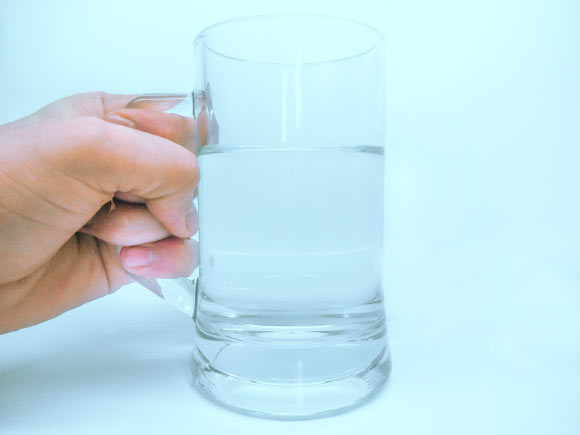A study published this week in the Proceedings of the National Academy of Sciences challenges the popular idea that we should drink 8 glasses of water a day for health.

Drink water according to thirst rather than a schedule, researchers recommend. Image credit: Photoshot.
The research, led by Monash University scientists, has revealed the mechanism that regulates fluid intake in the body and stops us from over-drinking.
The results show that a ‘swallowing inhibition’ is activated by the brain after excess liquid is consumed, helping maintain tightly calibrated volumes of water in the body.
“Drinking too much water in the body puts it in danger of water intoxication or hyponatremia, when vital levels of sodium in the blood become abnormally low potentially causing symptoms ranging from lethargy and nausea to convulsions and coma,” the authors said.
Building on previous research, they asked participants to rate the amount of effort required to swallow water under two conditions: (i) following exercise when they were thirsty and (ii) later after they were persuaded to drink an excess amount of water. The results showed a three-fold increase in effort after over-drinking.
“Here for the first time we found effort-full swallowing after drinking excess water which meant they were having to overcome some sort of resistance,” said lead co-author Dr. Michael Farrell, of the Monash Biomedicine Discovery Institute at Monash University.
“This was compatible with our notion that the swallowing reflex becomes inhibited once enough water has been drunk.”
Dr. Farrell and his collaborators used a brain-scanning technique called functional magnetic resonance imaging (fMRI) to measure activity in various parts of the brain, focusing on the brief period just before swallowing.
“Using fMRI, we investigated whether swallowing inhibition is present after more water has been drunk than is necessary to restore fluid balance within the body,” the scientists said.
“This proposal was tested using ratings of swallowing effort and measuring regional brain responses as participants prepared to swallow small volumes of liquid while they were thirsty and after they had overdrunk.”
The fMRI showed the right prefrontal areas of the brain were much more active when participants were trying to swallow with much effort, suggesting the frontal cortex steps in to override the swallowing inhibition so drinking could occur according to the researchers’ instructions.
“If we just do what our body demands us to we’ll probably get it right — just drink according to thirst rather than an elaborate schedule,” Dr. Farrell said.
“Elderly people, however, often didn’t drink enough and should watch their intake of fluids,” he added.
_____
Pascal Saker et al. Overdrinking, swallowing inhibition, and regional brain responses prior to swallowing. PNAS, published online October 10, 2016; doi: 10.1073/pnas.1613929113
This article is based on a press-release issued by Monash University.







